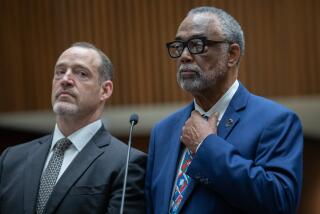California ethics agency relaxes rules on gifts to politicians
State lawmakers and city council members can accept expensive gifts from lobbyists without disclosure if they are dating, and can receive meals and lodging in lobbyists’ homes without telling the public, under rules approved Thursday by the state ethics agency.
In addition, officials can accept tickets to Major League Baseball games and other sports and entertainment events if they are performing a “ceremonial duty,” such as throwing out the first pitch. They no longer have to report such gifts, although their government agency must do so, and now they can bring a guest. In another change, it doesn’t matter how much the gift is worth.
The rules overhaul by the Fair Political Practices Commission came in the wake of politicians’ complaints that they were confusing and overly intrusive.
“Gift regulations should apply only in situations when the public official receiving the gift makes governmental decisions that directly affect the person giving,” commission Chairwoman Ann Ravel said.
But groups such as Common Cause said some of the changes go too far, making it easier for lobbyists and others to influence elected officials by showering them with gifts, especially where romance is asserted.
“The problem with regulating corruption in this state’s political culture is that it is so prevalent that it even appears in the bedroom,” said Phillip Ung, policy advocate for California Common Cause.
State law currently bars public officials from accepting gifts valued at more than $420 from a single source or $10 from a registered lobbyist. Officials are required each year to disclose gifts worth more than $50 from many sources, including firms doing business with the state.
The new rules take effect Jan. 1.
Under one new rule, a public official would have to avoid voting on an issue benefiting a dating partner. But meals, concert tickets and other gifts provided by the partner as part of the relationship would not need to be disclosed or limited.
“To the extent that legislator/lobbyist dating is a problem, real or perceived, staff defers to the Legislature to police its own house,” wrote commission General Counsel Zackery P. Morazzini in a memo to the panel.
Commissioner Ronald D. Rotunda provided the lone vote against the exemption for “dating relationships.” He challenged Morazzini’s assertion that lawmakers should monitor their own behavior.
“I find that mind-boggling,” said Rotunda, a Chapman University law professor. He noted that the commission was created by voters because they “did not trust the Legislature. Had they policed their own house, we wouldn’t be here.”
Rotunda also objected to the allowance of “home hospitality” gifts, including meals and lodging. The commissioner said he thinks of home hospitality as a hamburger at a friend’s house, but the new rules could allow someone to host a lawmaker at a Lake Tahoe cabin for days.
“That could be worth thousands of dollars,” Rotunda said.
Ravel noted that “home hospitality” gifts have been allowed in the past on a case-by-case basis, and the new rules will limit that practice. Lobbyists and others doing business with the state will no longer be able to claim the “home hospitality” exception unless there is an “existing relationship between the parties that is unrelated to the official’s position” and the hospitality is provided in connection with that relationship.
That will be difficult to enforce, Rotunda said.
Common Cause raised concerns about the ticket rules.
Under other regulations adopted last year, an official’s agency must disclose the receipt of tickets to baseball games, the Academy Awards and other events. The newly adopted rules say officials themselves do not have to disclose them on the statements they file with the state every year detailing their economic interests.
Ung called for officials to disclose the receipt of tickets worth more than a certain amount, “where an official performs a small ceremonial role at a sporting event and receives $1,000 front-row tickets to watch the sporting event.”
More to Read
The biggest entertainment stories
Get our big stories about Hollywood, film, television, music, arts, culture and more right in your inbox as soon as they publish.
You may occasionally receive promotional content from the Los Angeles Times.







